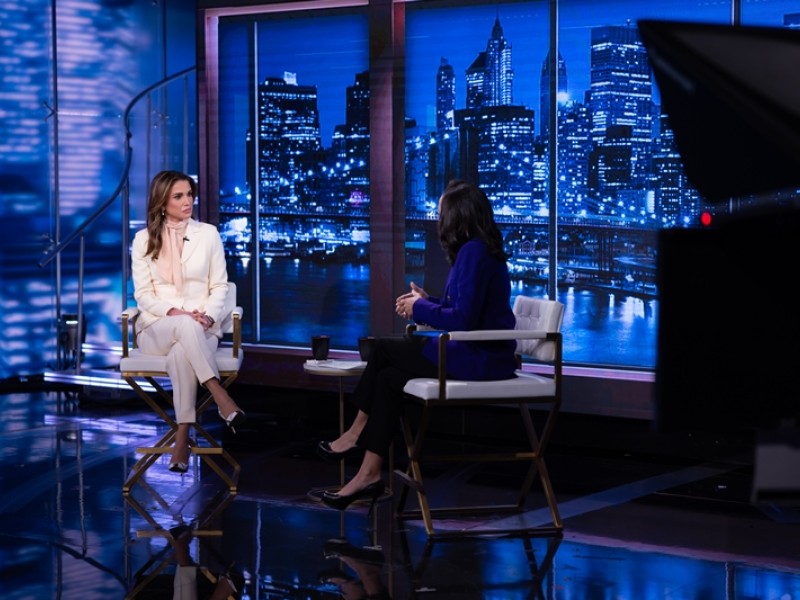Queen Rania to Katie Couric: “It's Crucial to Build Trust with the Iraqi People”
Had the potential problems of the war been underestimated?
QUEEN RANIA: Well, it seems that there was a bit of a lag between the aftermath of the war and then the beginning of the relief efforts, because we saw a period of time when there wasn't much effort being put into -- at least there wasn't maybe a well-studied plan to deal with the humanitarian situation. And as a result, there was a little bit of a vacuum and there was time when there was a little bit of chaos taking place. And as a result, a lot of people have had to suffer. A lot of the medical aid was not available. The relief efforts -- as you know, there wasn't any clean running water. Electricity was out. And all this translated into a great deal of suffering for the Iraqi people. And that is why I sent that appeal to the coalition forces, to make it their top priority to restore the order that is needed and the security that is needed for the NGOs and other relief agencies to be able to go in and do their work.
Meanwhile, I know that you and King Abdullah recently gave blood to help individuals in Iraq. What prompted you all to do that?
QUEEN RANIA: Well, you know, the Jordanian people feel very strongly with the Iraqi people. They feel their suffering. And it was just one of the many ways that we're trying to help out the Iraqi people. We're gathering a lot of donations. As you mentioned, there was the blood campaign. We dispatched a mobile field hospital to Iraq, and we've sent a convoy of medical and food assistance to the Iraqi people. Jordan is perfectly situated to be a launching pad for a lot of the aid that's going to go into Iraq. We have a lot of things in common, both linguistically and culturally, and I think Jordan can play a very important role in doing so.
I know that in recent interviews you've warned against a prolonged U.S. presence in Iraq. You said, quote, "I think every nation in the world has its national pride, and no nation in the world ever welcomes an extended foreign presence. There needs to be some kind of time frame for this," and that Washington, in your view, should clearly spell out its intentions. What are your worst fears about a post-Saddam Iraq and the U.S. role in that country?
QUEEN RANIA: Well, Katie, I think the most important thing is for the coalition forces to establish trust with the Iraqi people. The Iraqi people need to know where they're heading. You know, there's been a lot of confusion, a great deal of uncertainty. And let's not forget the challenges in Iraq. Iraq is a country that has suffered for 23 years, has endured three wars, has lived under economic sanctions for 12 years, which has left the country in a very bad situation. Public services are in very bad shape.
You know, hospitals, schools, all these things need to be looked at. At the same time, the Iraqi population views the coalition with a great deal of suspicion. At the end of the day, you have armed strangers in your house. And it's only natural to feel wary of their intentions. And, to add to that, there's a great deal of expectations from the Iraqi people. They view the United States as a very powerful nation with a lot of resources at its disposal, and therefore the ability to bring about swift changes if it really wanted to.
So therefore, it's crucial to build trust with the Iraqi people. And that can be done by restoring a lot of the services -- you know, water, electricity, all those kinds of things, building what has been destroyed during the war, and equally important, to make sure that the Iraqi people have a sincere and solid say in the rebuilding of their nation and to establish very clear lines of communication with the Iraqi people, to give them a great degree of visibility into their future. They're kind of confused right now. They don't know where they're going.
It's important for the coalition to explain what their role is going to be in Iraq, how long they intend to stay there, what kind of role the Iraqi people themselves are going to play in their future. All these things will help bring about an atmosphere that is conducive to peace and stability in Iraq.
Meanwhile, I know you and your husband have been walking a very fine line as friends of the United States, allowing thousands of U.S. troops in Jordan to be used mostly for defensive purposes. But that has not been popular in the so-called Arab street in Jordan. In fact, there's a quote in a recent New York Times article; there's a huge gap between the official stand and the popular stand. How difficult has it been for your husband and for the monarchy in general sort of handling this delicate balance?
QUEEN RANIA: Well, you know, Katie, from the Arab perspective, a lot of people view Iraq as the home team, if you will, and particularly given the fact that Arabs view any western intervention in the region with a great deal of suspicion. So it is not so much that people were supportive of the regime of Saddam. In fact, they weren't. But they were maybe opposing foreign presence. And this is why it's very, very important for the coalition forces to clearly explain to the Iraqi people what their role is going to be and how how long they're going to stay. And, you know, the president went out of his way to explain that, to reassure people that they have no intention of staying there for a very long time.
I personally believe that he has a great deal of integrity and he means what he says. But it's important for the Iraqi people to also know that. As for us here in Jordan, you know, we've felt very much with our people as well. We've felt very strongly with the suffering of the Iraqi people, and that was a major concern for us. But my husband is in a leadership position where he gets to see the overall picture, if you will, all sides of the equation. And he has a moral imperative to do what is best for his nation, what is best to secure the safety and stability of Jordan and the well-being and the interest of his people.
And finally, as you know, President Bush has said his next priority for the Middle East will be to establish a road map for a peace settlement between Israel and the Palestinians. Peace has been so elusive in that region, and yet it is so important to the Arab world to have an even-handed solution.
How optimistic are you that peace, true peace, will be forged in the Middle East?
QUEEN RANIA: You know, Katie, it's very important for us to really fight the feeling of cynicism that surrounds this issue. A lot of people have no faith in peace in the Middle East. But giving up on peace in the Middle East would be giving up on the futures of millions of people in our part of the world. And at the end of the day, the Palestinian-Israeli conflict is really at the heart of the problem in the Middle East. It is the main source of anger and frustration. And once we can solve this issue -- and I am very encouraged by the president's words; I think he's really fully committed -- and now is the time for us to move forward on the ground, to see changes on the ground for the Israeli and Palestinian people. This is the surest, quickest and most effective way to fight terrorism, by the way, because it is the main reason, as I said, for the anger in our part of the world, and, as a result, for extremism and sometimes terrorism.
So it is important for us to be able to move on this track as quickly as possible. Also, the credibility of the United States is at stake here, because, as you know, there's a great deal of anti-Americanism in this part of the world. And one of the best ways to try to reassure the Arab population that the United States has their best interest at heart would be to pursue a positive discourse, to assure the Arabs that they want to bring about a positive change in their lives. You know, fighting terrorism doesn't require war plans. In many ways it requires peace plans. And those peace plans can be much more effective.
Your Majesty, Queen Rania of Jordan, thanks so much for talking with us. We really appreciate it.
QUEEN RANIA: Thank you, Katie. It was a real pleasure.
© Copyright, NBC
مواضيع مختارة
موقع جلالة الملكة رانيا العبدالله الرسمي
هذا الموقع الإلكتروني لا يدعم متصفحات الإنترنت القديمة. الرجاء تحديث متصفح الإنترنت إلى نسخة أحدث من إنترنت إكسبلورر 9
متصفح الإنترنت الذي تستخدمه قديم. لتحسين مستوى الأمان عند تصفح مواقع الإنترنت و مشاهدتها بالشكل الصحيح و بفعالية افضل قم بتحديث متصفح الإنترنت الخاص بك



